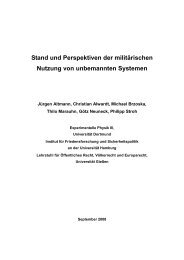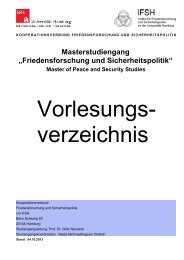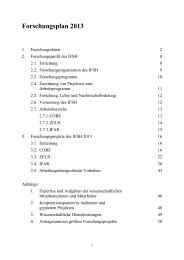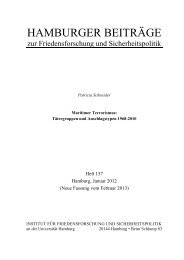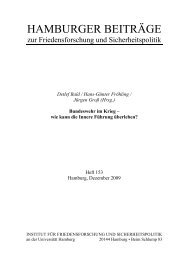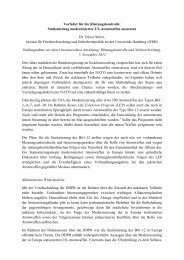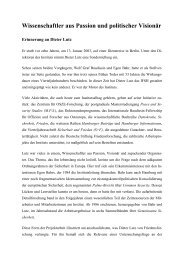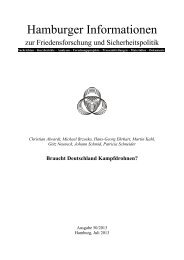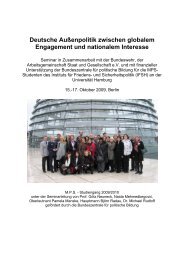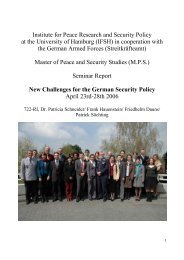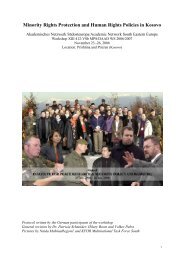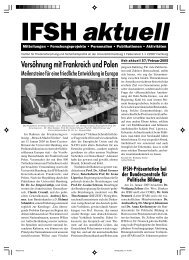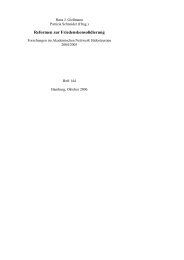Download | PDF - IFSH
Download | PDF - IFSH
Download | PDF - IFSH
Sie wollen auch ein ePaper? Erhöhen Sie die Reichweite Ihrer Titel.
YUMPU macht aus Druck-PDFs automatisch weboptimierte ePaper, die Google liebt.
Jelena Djokovic<br />
Woman in Peacebuilding. The Role of Serbian Women’s Peace Organisations<br />
in “Dealing with the Past” (DWP) Processes<br />
1. Introduction<br />
It has always been more than obvious that the work of women in crisis prevention and conflict<br />
management remains invisible or virtually un-acknowledged. As Donna Pankhurst says, most<br />
approaches to peacebuilding have either ignored or marginalised issues of gender and women.<br />
Women consistently remain a minority among participants in peacebuilding projects.<br />
This essay’s topic, the Balkan region, is a case in point. Balkan women are involved to a great<br />
extent in realising sustainable peace in the Balkan region, yet they are still not given official<br />
acknowledgement. In response to this situation, the UN Security Council adopted Resolution 1325<br />
on October 31 in 2000. The resolution aimed at “[r]eaffirming the important role of women in the<br />
prevention and resolution of conflicts and in peace-building, and stressing the importance of their<br />
equal participation and full involvement in all efforts for the maintenance and promotion of peace<br />
and security, and the need to increase their role in decision-making with regard to conflict<br />
prevention and resolution [and] calls on all actors involved, when negotiating and implementing<br />
peace agreements, to adopt a gender perspective, including, inter alia: Measures that support local<br />
women's peace initiatives and indigenous processes for conflict resolution, and that involve women<br />
in all of the implementation mechanisms of the peace agreements”.<br />
My work focuses on the gender aspects of peacebuilding work, and more precisely on the role of<br />
women in forwarding the concept of Dealing With the Past (DWP) as an important part of broader<br />
peacebuilding. Thus, the central question of my research is: In what specific ways can women<br />
contribute to the process of DWP?<br />
The methodological approach of this work is based both on peacebuilding literature and on<br />
literature on the role of women in peace processes, with special emphasis on the DWP concept as<br />
well as on empirical data (14 interviews in different women’s peace organisations in Belgrade).<br />
The concept of Dealing With the Past (DWP) consists of the following main elements: international<br />
and national courts, reparations, lustration, truth and reconciliation commissions, education, and<br />
different healing methods.<br />
2. Theory<br />
Post-conflict peacebuilding is a concept for the reduction of hostile perceptions in the aftermath of<br />
war as a means to prevent further conflicts. It tries to maintain the newly-attained peaceful<br />
conditions.<br />
The term ‘post-conflict peacebuilding’ was created in 1992 by the then-UN General Secretary<br />
Boutros Boutros Gali, based on Johan Galtung’s theory on peacebuilding. Since then, the term has<br />
appeared frequently in diplomatic, political and even military discourses, especially as no less than<br />
93 percent of major conflicts since the early 1990s have been intrastate conflicts, which often do<br />
not end after a peace agreement has been signed. Often the causes of conflict remain and can<br />
produce further conflicts. In those cases pressure from the international community is usually<br />
necessary to promote peacebuilding.<br />
Because of the continual nature of these new intrastate conflicts, the term ‘post-conflict<br />
peacebuilding’ is no longer accurate, and a new concept should be discussed: “We should not use<br />
the term ‘post-conflict.’ Conflicts in fact do not end, but they change (...) Therefore the best term is<br />
probably ‘post-agreement’ or ‘post-settlement work’ – as in for example ‘post-settlement political,<br />
economic and social work” (Fitzduff 2003, in Austin 2004:375).<br />
43



